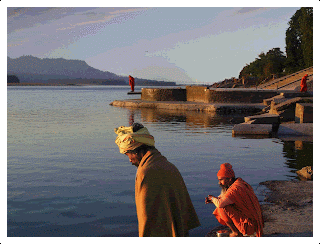Gangotri is the first human settlement that Ganga (or Bhagirathi - the main tributary of Ganga) sees after originating at Gaumukh. Gangotri is nothing more than a stretch of some shops, mainly restaurants on top of which are hotels catering to the devotees and tourists (especially the tracking enthusiasts). It is famous also for the Ganga temple that was built in the 18th century by Amar Singh Thapa, a Gorkha general. Gangotri shuts down during winter months, and by shuts down I mean completely shuts down. Even electricity and water supply to the village are shut. People move down to nearby towns during these months and come back up again during summers, when the Ganga Temple and the Gangotri National Park reopen.
The Ganga Temple closes on Diwali day every year and reopens in summers usually in April or May. When the temple is closed the idol of Goddess Ganga is said to be brought down to another Ganga temple in the village of Mukhba. This is what is written all over the internet and is perceived by most. However, the priest at the Ganga temple in Mukhba told me that it is not the whole idol that is brought down, but it is only the "mask" of Goddess Ganga. The mask then is placed inside a tiny chamber in the chest of the idol of Goddess Ganga in the temple in Mukhba. When the temple in Gangotri reopens, the mask is then taken back in big procession with all pomp and show.
We (I and my brother Lt Rajul Rathi and our driver Naeem) headed towards Gangotri on May 10th. It is required that one gets a pass to enter the Gangotri National Park where Gaumukh glacier is situated. Towards that I had a meeting with District Forest Officer of the area - Dr IP Singh - in Uttarkashi, who would issue us a pass. Now a days it is only 150 visitors per day that are allowed into the national park to go to the Gaumukh glacier. This is to protect receding Himalayan glaciers from human activities, according to Dr Singh. And the passes can only be gotten at office of the forest officer in Uttarkashi- the district head quarters of the area. It was at the Forest Department guest house that we stayed overnight before heading to Gangotri the next morning.
Dr. Singh also briefed us about the actual situation on the glacier. It sure is melting, but on top of that it is getting dirty too, mainly due to plastic bags and other non-biodegradables left behind by trackers, especially westerners. An idea was implemented few years back to take a refundable deposit of Rs 100 ($2) per person before s/he enters the Gangotri National Park. This deposit would be refunded if the person brings back all the plastic bags s/he carries into the Park. Rs100 is a lot for many, but for a westerner it is not a substantial amount to worry about bringing back all the plastic bags... and many, if not most, don't.
We reached Gangotri around noon, it was raining... and cold...really cold it was. Headed directly to the forest departments guest house where we would be putting up for the night. And ... no electricity! no running water ... was told that we would not be able to get a guide to the glacier as the park was not officially open yet. The caretakers of the guest house were really nice...they offered us hot tea.
My plan to visit the Gaumukh glacier during this trip was cut short due to inclement weather (rain and sub zero temperature), and lack of electricity and running water in Gangotri. We were two days early before the Ganga temple, and thus the village of Gangotri, would open and supply of electricity and water to the area would resume. I decided that I would come back to Gaumukh later, and maybe also cover Tapovan then.
After staying in Gangotri for a few hours, visiting the Ganga Temple and collecting some holy water, we returned. What really interested me was that the color of Bhagirathi here at the origin were the same as that of river Ganga anywhere else - greenish. No wonder Bhaigirathi is the source river of Ganga.
After leaving Gangotri we made a night halt at Harsil. The weather was still terrible. It was very very cold and it was raining. Thanks to the Indian Army base at Harsil, we had a nice overnight stay ...
